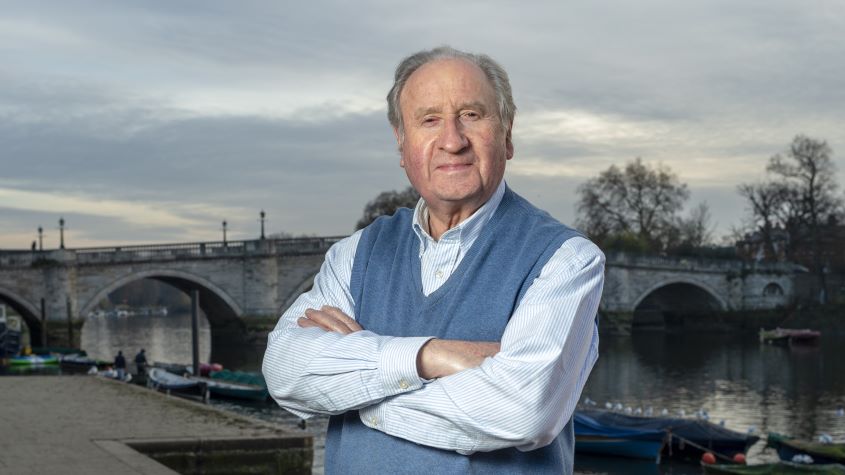Lord Lee of Trafford: how I’ve invested since 1962
Katie Binns speaks to Lord Lee - one of the UK’s first ISA millionaires - about how UK shares made him his million, how he’s weathered many market storms over the last 60 years, and his top tips for investors today.


Get the latest financial news, insights and expert analysis from our award-winning MoneyWeek team, to help you understand what really matters when it comes to your finances.
You are now subscribed
Your newsletter sign-up was successful
Want to add more newsletters?

Twice daily
MoneyWeek
Get the latest financial news, insights and expert analysis from our award-winning MoneyWeek team, to help you understand what really matters when it comes to your finances.

Four times a week
Look After My Bills
Sign up to our free money-saving newsletter, filled with the latest news and expert advice to help you find the best tips and deals for managing your bills. Start saving today!
Lord Lee of Trafford became the first ISA millionaire in 2003 after building a dedicated portfolio made up solely of UK shares. The ex-Conservative MP-turned-Liberal-Democrat-life-peer has invested through several financial crises: the 1970s, Black Wednesday, the dotcom bubble, 2008, the pandemic and the current cost of living crisis.
Now aged 80, he flicks through his stack of old investment ledgers to help him recall the shares he has bought since 1962. “Some names are still familiar,” he says.
There’s the William Morrison shares he bought in November 1967 at 27 shillings and 6p which he then sold the following day at 34 shillings to make a tidy profit of £30. There’s a record of the Bodycote Plc shares he bought in 1972. And the JJB Sport shares he bought in the 1990s.
MoneyWeek
Subscribe to MoneyWeek today and get your first six magazine issues absolutely FREE

Sign up to Money Morning
Don't miss the latest investment and personal finances news, market analysis, plus money-saving tips with our free twice-daily newsletter
Don't miss the latest investment and personal finances news, market analysis, plus money-saving tips with our free twice-daily newsletter
Other names are less familiar: the Refuge Assurance shares that he bought in 1977 and describes as a “door-stepping insurance company” is now better known as Royal London. And there’s a caravan park operator, a garden centre and an industrial estate in Manchester that are not household names.
After more than 60 years of investing, this David-Attenborough-of-the-investment-world believes the ISA is the best tax wrapper in the western world. “Friends from abroad are envious of its many tax advantages: free of income tax, free of capital gains tax, if you hold AIM shares for two years they are free of inheritance tax. And on death spouses can transfer the ISA benefit.”
He explains his approach to his noteworthy picks, past and present.
What was your first investment?
I bought my first share in 1958 at the age of 16. I invested all my savings - £45 - in a company called Aviation and Shipping which was one ship - and the ship went down so my £45 went down with it. It wasn’t the most auspicious of starts to my investing life.
How did you become an ISA millionaire?
When Personal Equity Plans (PEPs), the precursor of ISAs, came out in 1987 I realised this was a great tax-free saving opportunity. But I had to find a plan manager who would allow me to make my own investment decisions rather than buy from an approved list - there were very few plan managers at that time who would accommodate PEPs and those that did tended to restrict you to a particular list of shares that didn’t suit me at all.
I eventually found someone called Steve at Midland Bank in Sheffield, opened my PEP and put in the maximum amount in the ensuing years.
One of my first investments was in Pifco, a Manchester-based, family-owned electrical manufacturer. It satisfied most of my investment criteria – a solid, established business, it was profitable, it was paying dividends of 6% and it was cash rich too. Eventually it was taken over by the American kitchen gadgets group Salton and I made a good profit.
That first investment set my approach to picking stocks really and having invested the maximum amount over 15 years, reinvested dividends and fortunately benefited from several profitable takeovers and reinvested the proceeds from them - we’re talking something like £126,000 [over this 15 years] - my ISA was worth £1m in 2003 (ISAs were introduced in April 1999, replacing the earlier PEPs and Tax-Exempt Special Savings Accounts (TESSAs)).
You say you’ve learnt to recognise opportunities that arise at challenging times. What do you think is interesting to invest in right now?
I’ve been buying Christie & Co, they are the leading specialist property broker for hotels, restaurants, children's nurseries, pharmacies and vet and dental practices. I believe they are considerably undervalued. And at a time like this when a lot of firms are under pressure and closing and other companies are acquiring them - there’s activity there.
Manolete and Partners is another one. It’s a specialist insolvency litigation firm. Sadly there is going to be an increasing number of firms that will go insolvent after being artificially propped up during the furlough period. Manolete often buys cases from administrators when the directors have misbehaved and misappropriated monies - they chase those directors to repay the funds and then proceeds are then split between Manolete and the company’s creditors.
STV, Scottish Television, looks undervalued. It’s on a relatively low single figure price earnings ratio. It produces high quality content, has a close working relation with ITV and is clearly the dominant player in commercial television in Scotland. And there’s quite a useful dividend yield too!
Goodwins is an outstanding global engineering business based in Stoke on Trent. And they operate in niche areas: for example, they have a major contract with Sellafield to produce very large metallic boxes - for want of a better word - for nuclear waste fuel. They are probably the only company in this country capable of casting the quality and size of this product that Sellafield requires.
Brulines, the cellar monitoring equipment supplier, had a difficult time with pub closures but it’s swinging back now. Its tech remotely monitors and records the total volume of liquid that passes through the beer lines 24 hours a day at around a third of UK pubs. The tech is unique and advanced: they are now a significant player in monitoring vending machines in the UK and US.
These are all companies I’ve been buying recently.
You describe your investing approach as conservative. How so?
You need common sense and patience - and patience is the thing most people don’t have. They chop and change which is not the way to invest in my view. Technology means you see all your shares on an app, ipad etc. So the temptation to take your profits is all the greater.
To make significant money you need to stay put in good quality companies whether they are large or small. And avoid the losses. Everyone has some successes but often they are diluted by losses and the trick is to minimise the losses or avoid.
So to be a successful investor you’ve got to enjoy doing it, you’ve got to spend a certain amount of time reading the papers and studying and attending annual general meetings.
I also only invest in UK companies - not that I ignore the potential growth in emerging markets but I do that by investing in what I believe are quality UK companies that trade globally. This way you get the advantage of a global approach while having the advantage of UK corporate transparency and corporate responsibility.
I don't have the knowledge or expertise to invest directly in China, for example. Nor do I want to. And I steer clear of healthcare, exploration, bio tech, contracting - not because I don’t think you can’t have success in those sectors but they are specialised areas for those with knowledge and I simply don’t have the knowledge.
One of your most successful investments?
I tend to believe in building up holdings where you have increasing confidence and knowledge in a company rather than looking for something new all the time. My largest holding is a company called Treatt, a chemical manufacturing company which specialises in flavours and fragrances in drink, food and cosmetics.
I first invested in them in 1999 when the share price was £1.50 and have bought on 34 different occasions. The more I’ve gotten to know them, the more I’ve liked them so I’ve built a substantial holding. Over the long-term it has been a winner, up by more than 500% in the past decade. Having come down in price in the last year they’ve still powered ahead as a company. Today the share price is about £6.50.
Get the latest financial news, insights and expert analysis from our award-winning MoneyWeek team, to help you understand what really matters when it comes to your finances.
Katie is deputy editor of Times Money Mentor and long-time contributor to the Sunday Times where she started on the Irish desk in 2012 and spent 10 years covering news, culture, travel, personal finance and celebrity interviews.
Her investigative work on financial abuse has examined the response of banks, the Financial Ombudsman and the child maintenance service to victims, and resulted in a number of debt and mortgage prisoners being set free - and a nomination for Best Finance Story of the Year at the Headline Money awards in 2021 and 2022.
Katie was also shortlisted for Freelance Journalist of the Year at the Headline Money awards in 2022, 2023 and 2024 and won Personal Finance Journalist of the Year at The British Bank Awards 2022.
-
 Should you buy an active ETF?
Should you buy an active ETF?ETFs are often mischaracterised as passive products, but they can be a convenient way to add active management to your portfolio
-
 Power up your pension before 5 April – easy ways to save before the tax year end
Power up your pension before 5 April – easy ways to save before the tax year endWith the end of the tax year looming, pension savers currently have a window to review and maximise what’s going into their retirement funds – we look at how
-
 Act now to bag NatWest-owned Ulster Bank's 5.2% easy access savings account
Act now to bag NatWest-owned Ulster Bank's 5.2% easy access savings accountUlster Bank is offering savers the chance to earn 5.2% on their cash savings, but you need to act fast as easy access rates are falling. We have all the details
-
 Moneybox raises market-leading cash ISA to 5%
Moneybox raises market-leading cash ISA to 5%Savings and investing app MoneyBox has boosted the rate on its cash ISA again, hiking it from 4.75% to 5% making it one of top rates. We have all the details.
-
 October NS&I Premium Bonds winners - check now to see what you won
October NS&I Premium Bonds winners - check now to see what you wonNS&I Premium Bonds holders can check now to see if they have won a prize this month. We explain how to check your premium bonds
-
 The best packaged bank accounts
The best packaged bank accountsAdvice Packaged bank accounts can offer great value with useful additional perks – but get it wrong and you could be out of pocket
-
 Bank of Baroda closes doors to UK retail banking
Bank of Baroda closes doors to UK retail bankingAfter almost 70 years of operating in the UK, one of India’s largest bank is shutting up shop in the UK retail banking market. We explain everything you need to know if you have savings or a current account with Bank of Baroda
-
 How to earn cashback on spending
How to earn cashback on spendingFrom credit cards and current accounts to cashback websites, there are plenty of ways to earn cashback on the money you spend
-
 John Lewis mulls buy now, pay later scheme
John Lewis mulls buy now, pay later schemeThe CEO of John Lewis has said the retailer will consider introducing buy now, pay later initiatives for lower-priced items.
-
 State pension triple lock at risk as cost balloons
State pension triple lock at risk as cost balloonsThe cost of the state pension triple lock could be far higher than expected due to record wage growth. Will the government keep the policy in place in 2024?
